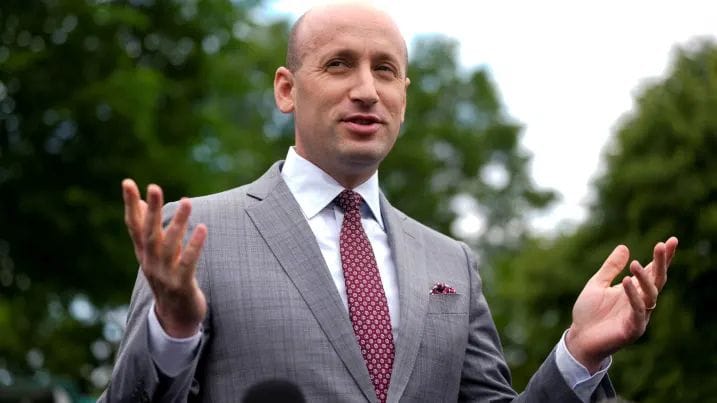The White House may soon take a controversial path in its immigration crackdown—suspending habeas corpus.
Stephen Miller, a top aide to President Trump, revealed that the administration is seriously thinking about this move. According to Miller, the Constitution allows suspending habeas corpus during situations like invasions. “The Constitution is clear,” he told reporters. “When there’s an invasion, suspending habeas corpus becomes an option.”
This statement has sparked intense reactions across the country.
But what does suspending habeas corpus actually mean?
Habeas corpus is a legal action. It forces the government to explain why someone is being held. Without it, people can be locked up without having their case reviewed by a judge.
That’s why Miller’s statement is causing concern. He hinted that whether this drastic measure will happen depends on how the courts respond.
A Rare and Serious Step
In American history, suspending habeas corpus has happened only four times. These include the Civil War, parts of South Carolina during the rise of the Ku Klux Klan, the Philippines in 1905, and Hawaii after Pearl Harbor. All were times of extreme danger.
So, why now?
Miller argues that migrants are using habeas corpus to stop deportations. The administration says some of these migrants are dangerous, even labeling some Venezuelans as gang members. These individuals have been sent to a high-security prison in El Salvador under the Alien Enemies Act—a law from the 1700s.
Legal experts and advocates disagree with how the government is using this old law.
Challenging Detentions in Court
Migrants and even international students have used habeas corpus to fight their detentions. For instance, students like Rümeysa Öztürk and Mahmoud Khalil recently used the courts to challenge their arrests.
The Supreme Court has also weighed in. It has allowed migrants to use habeas corpus to question deportations based on the Alien Enemies Act. In some cases, judges ruled in favor of the migrants, saying the Trump administration went too far.
Is America at War or Facing Invasion?
To justify suspending habeas corpus, the Constitution says there must be rebellion or invasion. Critics argue that these conditions do not apply today. They question if there’s truly an invasion happening right now that would require such a severe response.
Miller, however, claims that the president has wide power over immigration, especially through the Immigration and Nationality Act of 1965. He says the law gives the president room to change or end protective policies, such as Temporary Protected Status.
He also accused judges of fighting against both the executive and legislative branches of government. “These rogue judges are out of control,” Miller stated. “They are not just attacking the president, but Congress as well.”
Federal Judges Push Back
Yet, federal courts continue to check the administration’s power. Judges often rule on immigration policies because many lawsuits are filed by people affected directly.
In March, the Trump administration ignored a judge’s order to stop flights carrying Venezuelan migrants to the Salvadoran prison. That case later reached the Supreme Court.
Just days ago, a Massachusetts judge stopped the deportation of a group of migrants who could have been sent to Libya or Saudi Arabia. The court said the removals were unlawful.
Meanwhile, another federal judge released Tufts student Öztürk on bail. She had been detained for over six weeks after her visa was canceled. The court believed she deserved a hearing.
A Political War Over Rights
One Democratic staffer sharply criticized Miller’s comments about suspending habeas corpus. “Stephen Miller isn’t a lawyer. He just pretends to be one,” the aide said. “Nobody should listen to him seriously.”
These developments come as lawmakers debate whether migrants are being treated fairly under the Constitution. The Fifth Amendment guarantees due process. But if suspending habeas corpus becomes reality, many fear that migrants will lose their only legal protection.
The Alien Enemies Act has only been used three other times before Trump. All of them were during major wars. It was last used during World War II, when Japanese Americans were placed in internment camps. That decision remains one of the darkest moments in U.S. legal history.
A Dangerous Path Forward?
Immigration supporters say that habeas corpus is the only way migrants can get a fair hearing. Without it, they can be sent to dangerous places without anyone reviewing their case.
Some of those deported claim they have no links to gangs. They say the government’s accusations are false, and that they never got the chance to prove their innocence.
Rep. Jamie Raskin strongly warned against this trend. “If Trump can snatch people off the streets and send them to a foreign prison without due process, he can do it to citizens too,” said Raskin. “If there’s no chance to be heard, then our rights mean nothing.”
Why It Matters
The idea of suspending habeas corpus may sound technical, but it’s deeply personal. It decides whether someone can ask a judge for help. It determines if the government must explain why they’re holding you.
Once that protection is removed—even for non-citizens—the entire legal system can shift.
That’s why the debate is so heated.
Supporters of the Trump administration say it’s about national safety. But opponents believe it’s a step too far—one that endangers the rights of everyone, not just immigrants.
The Courts Are the Last Line
As the fight continues in courtrooms across the country, judges remain the final barrier. For now, they’re the ones stopping deportations, freeing detained students, and upholding constitutional protections.
If the White House goes through with suspending habeas corpus, legal battles will surely intensify. And Americans will have to decide just how much power any president should have.
Because in the end, the question isn’t just about migrants—it’s about what kind of justice system the United States wants to have.




